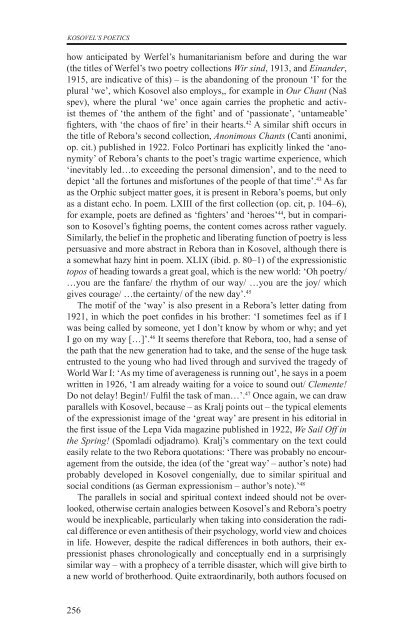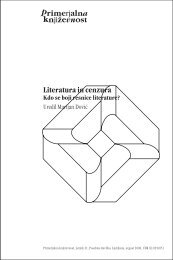razprave (pdf) - Društvo za primerjalno književnost - ZRC SAZU
razprave (pdf) - Društvo za primerjalno književnost - ZRC SAZU
razprave (pdf) - Društvo za primerjalno književnost - ZRC SAZU
- No tags were found...
Create successful ePaper yourself
Turn your PDF publications into a flip-book with our unique Google optimized e-Paper software.
KOSOVEL’s poeticshow anticipated by Werfel’s humanitarianism before and during the war(the titles of Werfel’s two poetry collections Wir sind, 1913, and Einander,1915, are indicative of this) – is the abandoning of the pronoun ‘I’ for theplural ‘we’, which Kosovel also employs,, for example in Our Chant (Našspev), where the plural ‘we’ once again carries the prophetic and activistthemes of ‘the anthem of the fight’ and of ‘passionate’, ‘untameable’fighters, with ‘the chaos of fire’ in their hearts. 42 A similar shift occurs inthe title of Rebora’s second collection, Anonimous Chants (Canti anonimi,op. cit.) published in 1922. Folco Portinari has explicitly linked the ‘anonymity’of Rebora’s chants to the poet’s tragic wartime experience, which‘inevitably led…to exceeding the personal dimension’, and to the need todepict ‘all the fortunes and misfortunes of the people of that time’. 43 As faras the Orphic subject matter goes, it is present in Rebora’s poems, but onlyas a distant echo. In poem. LXIII of the first collection (op. cit, p. 104–6),for example, poets are defined as ‘fighters’ and ‘heroes’ 44 , but in comparisonto Kosovel’s fighting poems, the content comes across rather vaguely.Similarly, the belief in the prophetic and liberating function of poetry is lesspersuasive and more abstract in Rebora than in Kosovel, although there isa somewhat hazy hint in poem. XLIX (ibid. p. 80–1) of the expressionistictopos of heading towards a great goal, which is the new world: ‘Oh poetry/…you are the fanfare/ the rhythm of our way/ …you are the joy/ whichgives courage/ …the certainty/ of the new day’. 45The motif of the ‘way’ is also present in a Rebora’s letter dating from1921, in which the poet confides in his brother: ‘I sometimes feel as if Iwas being called by someone, yet I don’t know by whom or why; and yetI go on my way […]’. 46 It seems therefore that Rebora, too, had a sense ofthe path that the new generation had to take, and the sense of the huge taskentrusted to the young who had lived through and survived the tragedy ofWorld War I: ‘As my time of averageness is running out’, he says in a poemwritten in 1926, ‘I am already waiting for a voice to sound out/ Clemente!Do not delay! Begin!/ Fulfil the task of man…’. 47 Once again, we can drawparallels with Kosovel, because – as Kralj points out – the typical elementsof the expressionist image of the ‘great way’ are present in his editorial inthe first issue of the Lepa Vida magazine published in 1922, We Sail Off inthe Spring! (Spomladi odjadramo). Kralj’s commentary on the text couldeasily relate to the two Rebora quotations: ‘There was probably no encouragementfrom the outside, the idea (of the ‘great way’ – author’s note) hadprobably developed in Kosovel congenially, due to similar spiritual andsocial conditions (as German expressionism – author’s note).’ 48The parallels in social and spiritual context indeed should not be overlooked,otherwise certain analogies between Kosovel’s and Rebora’s poetrywould be inexplicable, particularly when taking into consideration the radicaldifference or even antithesis of their psychology, world view and choicesin life. However, despite the radical differences in both authors, their expressionistphases chronologically and conceptually end in a surprisinglysimilar way – with a prophecy of a terrible disaster, which will give birth toa new world of brotherhood. Quite extraordinarily, both authors focused on256
















